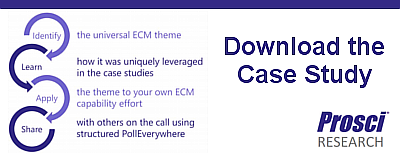One of the biggest challenges in introducing successful change management to any organisation can be securing the necessary buy in from those needed to take it forward.
In true chicken and egg fashion: the introduction of change management to an organisation is in itself a huge change, and implementing it successfully can in fact require the very skills, knowledge and experience you are attempting to introduce. Resistance is unavoidable.
In a Prosci webinar on the business case for change management, attendees commented on the most commonly faced challenges and objections. The distribution and nature of this type of resistance to change are shown below:
- What does it mean to apply change management on a Project? - 55%
- I don’t see the value of Change management – 42%
- Change management seems sort of soft and fuzzy – 38%
- Change management looks different to what I’m accustom to – 15%
Developing a business case for enterprise change management (ECM) is one of the most powerful vehicles for presenting the rational and approach for change management, needed to overcome some of the most common objections or challenges.
Gain Credibility
The campaign for the introduction of enterprise change management could take many forms and there is little to say which would be the most effective within your organisation.
However, a business case itself is a credible document. Its structure and use are familiar to senior leaders and project leaders alike. Presenting your business case in such a formal and familiar structure can be an effective tool for gaining support, commitment, authorisation and funding for change management. While also giving you the credibility you need to make a difference on the project.
Making your business case powerful requires strong situational assessments, project descriptions, solution descriptions and cost-benefit analyses. Your business case should address all of these in a clear and concise way that conveys the need for change and how it can be achieved.
Lastly, presenting your case in this format means that you are able to address the immediate misconception that change management is something soft and fuzzy.
Make The Connections to Project Results
As already seen some of the most common objections to change management is that many fail to truly understand the benefits and value it can bring to the organisation. And securing support for change management if you are unable to connect the people side of change to what leader’s care about – results.
A powerful business case should explain the rational of change management in the appropriate context, which constitutes the benefit realisation, thus the results and outcomes of the change. Within your case you should shift the conversation away from “change management is missing on this project” and towards “to get what we want out of this initiative, people have to change how they do their jobs”. Demonstrate the value to current business changes of building upon your organisation's change management capabilities.
Convey the Tangibility of Change Management
Creating tangibility around change management helps overcome the challenge of addressing what it really means to apply the practice.
It is difficult to support something you don’t fully understand and if you are unable to understand something how can you apply it? A powerful business case makes change management real for your audiences.
By introducing change management to your audience in language and terms that they can understand. Some of the most meaningful areas to your audiences are:
- Work Streams
- Milestones
- Deliverables
- Roles
By explaining change management in context of your own organisation as well as using terms your audience can understand removes the mystery and ambiguity for those who have not seen or experienced change management.
Resistance is the biggest opposition to change and the introduction of change management can be one of the biggest changes an organisation makes. Overcoming resistance requires understanding and patience. A well-constructed and powerful business case should address any concerns and opposition; while creating support and enthusiasm for the potential of the project.
Building a powerful business case may be the key to your change projects in Singapore. To learn more about the key themes in ECM, download your free copy of Prosci® Change Management Maturity Model below by clicking the image below:



